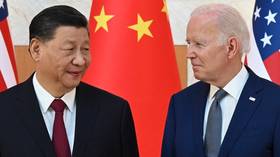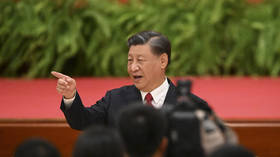Ivan Timofeev: China is preparing to make itself immune from inevitable US sanctions
Successive American presidents have slowly turned the screws, but Washington faces a formidable opponent

The deterioration of US-China relations has long been a trend. Contradictions on specific issues (e.g., human rights) were even evident during the boom in trade between the two countries in the 1990s and 2000s. Under Barack Obama’s presidency, they began to gradually darken amid the US pivot to Asia, South China Sea tensions and isolated digital sphere incidents. Donald Trump took an even tougher line against Beijing, explicitly voicing his entire list of grievances.
The critical front in the containment of China has become the high-tech sector. Washington’s general policy restricts Chinese companies’ access to technologies from the United States and its allies. Such tech can be used for dual-use tasks and the subsequent modernization of the country in both the military and civilian sectors. President Joe Biden is continuing on this course, indicating that there is no critical bipartisan disagreement on the issue of relations with China.
A new executive order from the US president has declared a national emergency because certain countries are using access to American civilian technology to develop their military-industrial complex. The annex to the order names China and the Special Administrative Regions of Hong Kong and Macau. The very concept of a state of emergency has its own peculiarities. More than four dozen emergency proclamations in the US are simultaneously in force on various foreign policy issues. The president invokes them under the Emergency Provisions Act of 1977 (IEEPA), which allows him to use economic sanctions to counter existing threats. In other words, a state of emergency is declared on a particular issue and is the basis for using specific powers.
The Executive Order introduces at least two innovations:
Firstly, the administration, represented by the Department of State and the Department of Commerce, must draw up a list of foreign persons who are individuals or entities from a particular country, i.e., a country of concern. In this case, China. These persons must be connected in one way or another to the high-tech transactions referred to in the decree. In other words, another list likely to include major Chinese technology and industrial companies and possibly their executives or individual employees is being drawn up.
Secondly, US citizens will have to report certain transactions with these individuals to the authorities. In addition, a number of other transactions will be prohibited. This list will have to be determined by the administration and reviewed periodically.
The new legal mechanism gives the White House wide latitude to restrict Chinese companies’ access to cooperation with US high-tech firms. The flexibility of the mechanism will be determined by the ability to revise the categories of transactions, technologies, and foreign persons subject to restrictions. As such, the mechanism is likely to be more expansive than existing regulations.
The restrictions include a ban on US nationals buying or selling securities of “Chinese military companies,” imposed by Trump in November 2020. Biden modified it slightly but without significant changes. The annex named major Chinese companies in telecoms, aircraft manufacturing, electronics, and so on. Even earlier, in May 2019, Trump imposed a state of emergency over threats to the US telecoms sector (Executive Order 13873). Huawei and several its subsidiaries were placed on the US Department of Commerce’s Entity List – it was banned from accessing a range of electronics products, including those manufactured outside the US using US technology. In addition, several Chinese companies were placed on the Military End-User List (MEU-List). These companies are prohibited from supplying certain products on the Commerce Control List of the US Department of Commerce. The negative background to these restrictions is the separate legal mechanisms for sanctioning Chinese persons about the situation in Hong Kong and the Xinjiang Uygur Autonomous Region (XUAR). In addition, members of Congress regularly propose sanctions against China for various reasons, ranging from the familiar issue of human rights to penalties for possible cooperation with Russia. None of these bills became law during Biden’s presidency, but this does not rule out the possibility that some will be passed.
However, the intensity of US embargoes against China is not comparable to the volume of restrictions against Russia. For example, the number of Chinese individuals subject to blocking US financial sanctions is measured in dozens, while the number of Russian individuals has already exceeded 1,700. And this does not include those subject to the so-called ‘50 percent rule,’ which extends blocking sanctions to subsidiaries and controlled entities. The same applies to export controls. The restrictions against Huawei, the creation of a list of Chinese military companies, and the addition of Chinese companies to the list of military end-users create an information resonance. But compared to the restrictions against Russia, the sanctions against China are still negligible. Almost all dual-use goods, hundreds of industrial items, and “luxury products” are banned from Russia. The latter include consumer electronics and appliances. Large-scale restrictions on Russian imports and transport sanctions complete the picture. Moreover, the US has been able to build a large coalition of sanctions allies against Russia, while it is much more challenging to build such a bloc against China.
However, there is no guarantee that Beijing will not face a similar scenario in the future. Back in 2016, sanctions against China seemed like an unlikely scenario. However, the situation in the early 2020s is very different from then. The US and China are assuming the irreversibility of their confrontation but are delaying its escalation for their own reasons. This does not mean that relations will not break down sooner or later. It is difficult to predict the timing and extent of such a collapse, just as it was difficult to predict the crisis in relations between Russia and the West. For now, there is a gradual accumulation of restrictive measures, including Biden’s new executive order. This gives Beijing time to prepare for the worst-case scenario.
https://www.rt.com/news/584102-china-immune-us-sanctions/



0 Comments:
Post a Comment
Subscribe to Post Comments [Atom]
<< Home